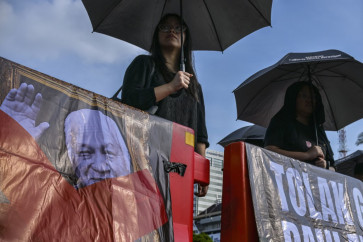Popular Reads
Top Results
Can't find what you're looking for?
View all search resultsPopular Reads
Top Results
Can't find what you're looking for?
View all search resultsWhy Jokowi must repeal ITE Law
At first, it was just another ludicrous Internet story
Change text size
Gift Premium Articles
to Anyone
A
t first, it was just another ludicrous Internet story. A woman vented her resentment on social media and unwittingly infuriated an entire population of a centuries-old sultanate. She was harshly bullied and later apologized.
This is a story that we know all too well. This happened before to a young lady in Depok who complained about having to give up her precious seat on a train to pregnant women, and to that British banker who referred to affluent Singaporean commuters as 'the poor'. Florence Sihombing is not alone, and Yogyakarta is not the only city to have indicted a person in the court of social media.
Our typical reaction would be to face-palm and remind ourselves again and again that the Internet is just such a terrible, terrible place. It's pretty much like high school, but with millions of inconsiderate jerks.
We were all hoping that Florence's apology would be an end to her bad day on the Internet and we all could go back to our lives, until we heard the news that she was detained by the Yogyakarta Police ' for doing what each one of us has been doing online long before Facebook, Twitter and Path were invented.
Her story then went from the ridiculous to the disturbing.
There is no question that what Florence did ' calling Yogyakarta 'poor', 'stupid' and 'uncultured'' is not at all pretty. She should have been more considerate. But what she did is not a crime and should not be criminalized.
For the sake of democracy, we must stand up to defend her.
This is no longer about the people of Yogyakarta being over-sensitive (come on, folks, Jakarta has been the object of really nasty curses for decades). This is no longer about the cancer of online bullying. Her case has brought to light a serious flaw in our legal system, which threatens each and every one of us.
The Gadjah Mada University student is the latest netizen to fall victim to the draconian Electronic Information and Transactions (ITE) Law. According to Florence's lawyer, she has been charged under Article 27 of the 2008 law, which carries a maximum punishment of six years in prison and a Rp 1 billion (US$85,351) fine.
Human rights activists and journalists have repeatedly called on the government to repeal this controversial law, arguing that it hinders freedom of speech and leads to human rights violations.
The wording of the articles in the law, they argue, is open to interpretation and can, therefore, easily
be abused.
The law basically criminalizes 'anyone who deliberately distributes or transmits electronic information or documents that contain slanderous and defamatory language'. While it is important to protect the public from slander and defamation, it is often unclear what constitutes slander and defamation on the web, and it is equally difficult to determine whether someone expressing his or her opinion on social media really intended to slander or defame others.
In Florence's case, it is totally preposterous that you can actually charge someone for hating a city and calling it 'stupid' and 'uncultured'.
According to the Institute for Policy Research and Advocacy (ELSAM), at least 37 people were charged with criminal offenses under the law between 2008 and 2013. Many of them were people criticizing the powers that be or just expressing their personal opinions.
Under the ITE regime, Prita Mulyasari, now an elected legislator from the Indonesian Democratic Party of Struggle (PDI-P), was sued by the Omni International Hospital in 2009 for defamation after she complained about the hospital's services via an online mailing list.
In 2012, Alexander Aan was accused of insulting Islam and jailed after writing on his Facebook page that God did not exist.
More than anyone else, president-elect Joko 'Jokowi' Widowo should be deeply concerned about Florence's arrest and begin thinking of ways to reform our Internet law. This is because the success of his administration will very likely depend on how free and effective social media is in rallying public support for his policies.
In other words, Internet freedom is required for his political survival.
Jokowi already owes his ascendancy to national leadership to the millions of tweets and articles shared online endorsing his election bid. And now with most of the political parties at the House of Representatives standing against him and
one of his coalition partners apparently threatening to leave should it obtain no ministerial posts in his Cabinet, Jokowi will need far greater public support to fend off the onslaughts of a hostile and more powerful legislative body.
The 2014 presidential race was a bitter fight for supporters of losing candidate Prabowo Subianto and they are anxiously waiting
for payback.
The biggest problem is that any revocation of or revisions to the ITE Law lay in the hands of those lawmakers. But Jokowi should not be afraid, as an army of online volunteers will stand behind him for this.
We cannot afford to retain the law; not because we want greater freedom to whine about our disappointing lives but because our new democracy ' which relies heavily on the participation of online citizens ' is at stake.
________________
The author is a staff writer at The Jakarta Post.










